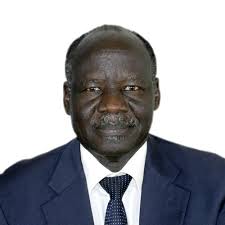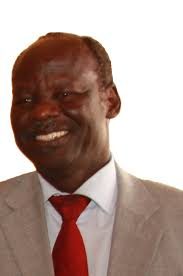THE NATIONAL DEMOCRATIC MOVEMENT (NDM)
Date: 23 January 2017
POSITION OF THE NATIONAL DEMOCRATIC MOVEMENT ON
The Way out of the Current Crisis in South Sudan
The crisis in the world’s youngest country, South Sudan, is basically a leadership crisis. The ruling party, the SPLM, and President Salva Kiir have failed the country and landed it in a ruthless civil war that threatens to turn into genocide while the world is watching. Since 2005, the SPLM under Salva Kiir have been running the Government of Southern Sudan/Republic of South Sudan. Despite the enormous resources at the disposal of GOSS/GRSS our people never saw basic services, such as health, education and infrastructure, delivered to them to say nothing about development. What they saw instead was massive corruption of unprecedented scale with the guerrillas of yesterday lining up their pockets with millions of dollars of public money. The little service delivery available was provided by the donor countries and non-governmental organizations. The people of South Sudan got disillusioned with their government. However, it was the power struggle within the leadership of the SPLM that finally boiled over into a civil war in December 2013 which resulted in the killing of tens of thousands of civilians and forcing millions of the larger population of the South Sudanese people out of their homes becoming displaced inside the country and refugees in the neighbouring countries. With instability, hunger and disease stepped in and need arose for urgent humanitarian assistance.
Worst still, the war took on an ethnic turn when the Nuer citizens were massacred in Juba and retaliation killings of the Dinka took place in Greater Upper Nile (Jonglei, Unity and Upper Nile States). The two warring parties committed heinous atrocities including arbitrary killings, rape and targeting children and the elderly.
Attempts to resolve the problem peacefully culminated in the signing of Agreement on the Resolution of the Conflict in the Republic of South Sudan (ARCISS). However, the agreement was defective in two important respects: it failed to address the root causes of the problem and it handed the power back to the SPLM that triggered the war in the first place. Many have called for the agreement to be implemented by a transitional government of technocrats. But, such genuine calls fell on deaf ears.
With the antagonists in charge, the implementation of ARCISS could not go ahead as planned until it was abrogated by the President in July 2016 igniting a fresh round of civil war that now threatens to turn into genocide. President Kiir ran away with all the violations of ARCISS and its eventual abrogation as the IGAD countries abandoned impartiality and sided with him. Hence, there is no peace agreement on the table and no mediator on offer. Impunity in violating the agreement by Salva Kiir is being rewarded, yet the victims are lectured to to seek peaceful means.
Today, South Sudan is sliding fast into an abyss under an ethnocentric government led by President Salva Kiir and his outfit, the Jieng (Dinka) Council of Elders. Insecurity has spread all over the country, the economy is in tatters and prices soaring on a daily basis. The bulk of the population is facing real hunger. The displacement of the population under the scorched earth brutalities of the government’s security organs continues. For the first time in the decades long history of conflict in South Sudan our refugees have exceeded one million.
Where do things stand?
From the outset of the implementation of the Agreement of the Resolution of the Conflict in the Republic of South Sudan, President Salva Kiir has shown disdain to its implementation. He violated the agreement several times while the Guarantors of the agreement acquiesced or abetted in the act. Examples are legion. For instance, he divided the country into 28 Bantustans in the name of States against the Agreement’s and the Constitution’s ten States, he refused to authorize the cantonment of troops in Equatoria and Bahr El Ghazal, and even in Upper Nile which he agreed to nothing was done. Finally, he abrogated ARCISS when he dislodged his First Vice President militarily and installed a puppet in his place. Today, he continues to unleash war on the entire country. Even Equatoria that was relatively peaceful during the two-year ethnic war, is now up in flames. Most recently, and encouraged by the acquiescence of the Region and the International Community to his violations of the Agreement, he divided the country more by creating more States in a country that is wallowing in poverty and government officials are not getting their salaries. To add insult to injury, he called for a “National Dialogue” in his den with him as the ‘Patron’.
The Anatomy of the Current Violence
In order to resolve this political problem in South Sudan, we should first identify what went wrong. The following are some of the major issues that led the country to the current cul de sac:
1. Failed leadership. The SPLM monopolized power in South Sudan since 2005. All this time, the SPLM has failed to lay the foundation of a viable nation-state and instead installed a military culture of entitlement and exclusion that permeated all aspects of public life. With that mentality they looted the country’s resources without abandon, leaving its people in abject poverty and destitution. The same leaders quarreled over the spoils in 2013 and dragged the country to a destructive ethnic war. They cannot be trusted again with the fate of our people.
2. The ARCISS was a flawed peace agreement. It failed to address the root causes of the problem and handed the power back to those who ignited the war and persecuted it with brutal means that resulted in war crimes and crimes against humanity. It was also an imposed agreement with those that imposed it (the Guarantors) being unable or unwilling to impose its implementation.
3. Death of a dream. In spite of being defective, ARCISS, if implemented faithfully, offered an opportunity for a peaceful transition to a democratic state. This hope was dashed when President Kiir refused to implement the agreement from Day One and eventually abrogated it in July 2016.
4. Impunity, both political and criminal, is being encouraged. For about 18 months now since ARCISS was signed, the AU was unable to set up the Hybrid Court for South Sudan (HCSS) in order to try those with the greatest responsibility in committing war crimes and crimes against humanity in South Sudan. Also, the IGAD has failed to follow through its resolutions on the implementation of ARCISS, especially the Communique of the 55th Session of the IGAD Council of Ministers on 31st January 2016 regarding freezing the operationalization of the 28 states created in contravention of the Peace Agreement. From that point on, IGAD changed its tone from keenness to implement ARCSS to turning a blind eye to or looking the other way in relation to the continuous violations by the regime in Juba of ARCISS, thus giving it a free hand to do whatever it wants with impunity. In its latest Communique, the IGAD Summit on the 8th of August 2016, went as far as calling for the Opposition to renounce violence with no political process in place. Such a cynical position, in effect, encourages more violence as the aggrieved parties have nowhere to go to so as to get their grievances addressed.
5. The insistence of IGAD and its partners that ARCISS is intact, when the reality is that the government in Juba now is that of SPLM-in government and its own created surrogate in the name of SPLM-in opposition, to say nothing about the absence of the other stakeholders. This government does not implement ARCISS as we know it but continues to violate its provisions in implementation of the programme of the Jieng Council of Elders through President Salva Kiir.
6. The Regional Protection Force is nowhere to be seen. The RPF to be deployed in Juba, was first proposed by IGAD and then adopted by the UN Security Council vide its Resolution 2304 on the 12th of August 2016. It offered a realistic possibility of not only providing for security in Juba, but, also to create a conducive atmosphere for a political discourse that would have led to the resolution of the current logjam and bring insecurity and violence to an end. However, the regime in Juba, in a well calculated move, first rejected outright then dilly-dallied, procrastinated and finally froze the matter as the proponents of the proposal stood impotent. The Security Council itself got divided on the steps to be taken against such intransigence. Again, another opportunity to bring about a lasting peace was missed. Little wonder that violence has now erupted in Equatoria on a scale unseen before.
The Way Forward
The current insecurity and the spread of the armed conflict in the country must rightfully be laid at the door of President Salva Kiir. He denied space to the peaceful political opposition and the Press to express themselves freely, abrogated the Peace Agreement and unleashed his security organs on innocent civilians who were just calling for their legitimate rights. It goes without saying that denial of individuals’ rights is a form of violence. President Kiir initiated violence and then unleashed the state security organs, which are ethnically composed, on people whose lands were grabbed by Kiir and handed them to his ethnic group. Thus, he left the aggrieved with no choice but to take up arms in self-defence. It is absolutely cynical and insensitive to turn around to ask the victims to relinquish self-defence. This goes contrary to common sense and the known international norms.
The call by Salva Kiir for a national dialogue cannot be taken seriously for it didn’t satisfy the requirements of what is needed for the dialogue to achieve the desired results. The National Democratic Movement has earlier in a separate statement dealt with this matter in some details. Suffices it here to reiterate that the objective of that “National Dialogue” is far from seeking peace; it is an attempt to buy time for the regime in Juba to impose its will on the South Sudanese. First, there can never be a meaningful bottom-up dialogue, as suggested, when the country is still engulfed in armed conflict and about half the population displaced from their homes. This means that peace must be attained first. Second, what was set out as objectives of the National Dialogue are processes already envisaged in ARCISS under “National Reconciliation and Healing’ and “Parameters for Permanent Constitution”. Therefore, what was needed was a faithful implementation of the Peace Agreement and these objectives would have been realized. Kiir, by calling for a National Dialogue, was, in effect, sidestepping ARCISS. Yet, the Guarantors of the same gave him a nod of approval. This is flabbergasting. Third, the culprit installs himself as the judge and patron to see through the monologue! Fourth, the epicentre of violence where thousands of innocent lives were massacred, and politicians and journalist who were pursuing peaceful expression of opinion were murdered, imprisoned, tortured, harassed or denied free movement, and from which many patriots ran away for their lives, is now declared to be where the dialogue will take place. Who in his/her right mind will take such a proposal seriously?
Simply put, this so-called dialogue is ill-conceived, lacks ingredients of a serious undertaking let alone chances of success and must be treated with the contempt it deserves.
The way forward is indeed to convene a national dialogue conference. But, it is a dialogue different from the monologue pursued by the regime in Juba. It is an inclusive dialogue that brings together all the stakeholders in the country, not just those carrying arms, in a round table. This dialogue should aim at addressing the root causes of the problem and avoid rewarding those who ignited the war and perpetuated it. It must avoid the mistakes of the mediation that led to the conclusion of ARCISS in 2015. The dialogue is to take place in a neutral territory and facilitated by a neutral organization/country or individual(s), not quarters that have not been seen to be impartial during the implementation of ARCISS. We have concrete ideas on such a way forward which we are ready to discuss with all concerned parties with a view of reaching a consensus.
South Sudan is on the edge of a precipice. It is, therefore, incumbent upon the South Sudanese and their friends the world over to help prevent its slide into oblivion, anarchy and genocide. The time is now or never.
Dr Lam Akol,
Chairman,
National Democratic Movement.
Addis Ababa, 23 January 2017.
Editor’s Note: The views expressed in the “Documents Page” are solely the opinions of the writers. The veracity of any claims made are the responsibility of the author’s and are not necessarily endorsed by The Malakal Post. The Malakal Post, reserves the right to edit articles before publication. If you would like to submit an opinion article or analysis, please email your article at: info@malakalpost.com















